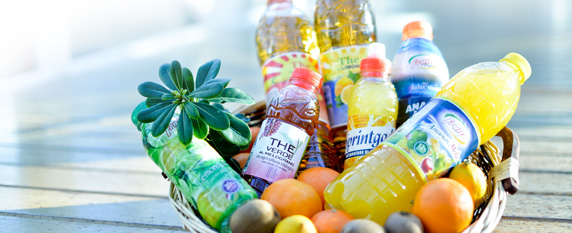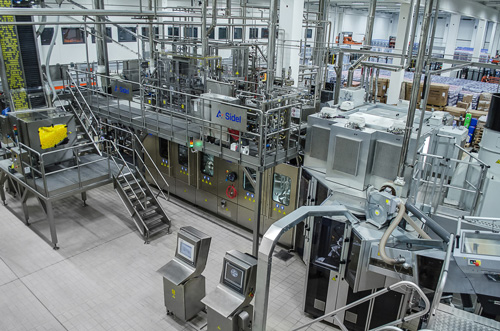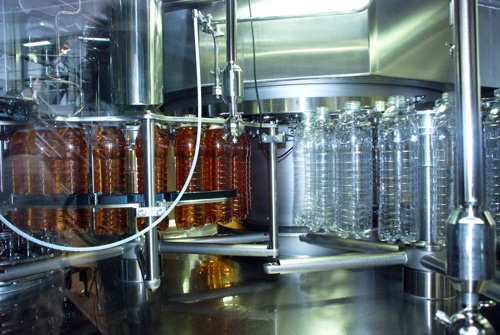Press Contact
For press requests, please contact our press representatives
TALA Communications | Jessica Friend Bartlett

14/04/14
The introduction of the technology, which removes the need for any bottle rinsing, has enabled lightweighting of the company's 1.5 litre bottles, with material savings of 20%. The aseptic PET Combi achieved 95% efficiency while allowing doubling of the current aseptic production capacity. Fitted with an ecological oven, the solution has created energy savings of 43% at the blowing stage.
 Widening its offering to meet market
demand
Widening its offering to meet market
demand
In today's fast-changing beverage market, bottlers need to be fully aware of consumer trends. Market demands are continually changing and beverage producers are constantly looking to be proactive in innovating new recipes and products.
Fonti Di Posina had been bottling the mineral water of the Italian province of Vicenza for over 30 years, first moving into PET bottling of it in 1986. At the foot of the Little Dolomites, the bottling plant is situated in the Posina valley, the source of the company's water and one of the most beautiful and unspoilt areas of the Italian Alps. Protected from pollutants, quality is maintained with no chemical treatment. The purity of Fonti Di Posina's 'Lissa' brand has proved popular with consumers all around the world. The company exports around 50% of its total production and the product is present in many of the best catering establishments, from Australia to China.
While consumer demand for more sophisticated beverages has been steadily increasing over recent years, the company has been working to expand its offering based on its experience of production and water purity. The company originally invested in an aseptic bottling line in the year 2000 in order to package beverages such as fruit juices and teas on behalf of retailers and private labels throughout Italy. It soon established a healthy reputation as a co-packer for these drinks, although the limited production capacity of 6,000 bottles per hour and high energy consumption of the original wet aseptic line was holding Fonti Di Posina back in terms of expanding business opportunities.
 Investing in innovative technology
Investing in innovative technology
To build on its reputation and its success, both as water producer and as a co-packer for aseptic filled beverages - and to expand production capacity - the company realised that something had to be done. Fonti Di Posina started looking at every option for aseptic filling. "Our objective was to invest in the latest innovative packaging technology from the market," explains the President of Fonti Di Posina, Matteo Frugani.
Therefore, the decision was taken to invest in a new line equipped with a low output, aseptic integrated blow-fill-cap solution with dry decontamination for both preforms and caps which offered high production efficiency. "There was no room for error and we could not afford a field-test machine. Sidel has a good reputation - and when we visited the different bottling plants to see the technology in action, we became convinced of the performance of the dry preform decontamination solution," said Antonio Biella, shareholder of holding company Montecristo, the main owner of Fonti Di Posina. "We felt confident in our choice as this is not a prototype but a proven technology that produces juice drinks, tea and even UHT milk."
The new line was installed in a filling hall built as an extension to the existing bottling plant, its compact and linear footprint simplifying and speeding up the installation process. Validation of the aseptic process was achieved a couple of weeks later on production of 0.5 litre bottles of tea with the line running at a rate of 12,000 bottles per hour. It was the first time ever that an Italian bottling company had invested in such a machine without bottle rinsing.
Flexible production of a wide range of drinks
Equipped with the low output aseptic blow fill cap solution, the line is currently responsible for the production of more than 40 different recipes for retailers and private labels. This includes teas, fruit juices and energy drinks, with both standard caps and sport caps in a variety of bottle formats.
"In total, more than a hundred different bottle references will be produced on this line at the end of the year and we target two hundred within two years", said Agostino Biella, another shareholder of Montecristo. "As production often needs to be changed several times per day, this investment has made a real difference by reducing the time required to clean and sterilise the machine thereby making changeover faster. We want to be in the right place, at the right time with the right product," continues Antonio Biella. "This is why we needed very flexible production capabilities that could allow us to produce a very broad range of beverages in different bottle formats, mainly in small batches."
 No water and energy savings of
43%
No water and energy savings of
43%
The efficiency of the technology and its contribution to a more sustainable business were other major advantages. Third shareholder of the Montecristo holding, Marco Colombo, explained: "We were really convinced by the dry preform decontamination technology because we no longer have to use peracetic acid or warm water to rinse the bottles. We are now using less than two litres of chemicals per hour and no water to decontaminate preforms and caps. This significant reduction in waste and resources fits perfectly with our vision of protecting the environment while ensuring beverage quality and food safety for our customers."
Fitted with Sidel's new ecological oven, the Combi Predis FMa has also reduced energy consumption during the preform heating process. The oven's optimised configuration requires fewer lamps and fewer heating modules. This has created a saving of 43% in the usage of electricity.
Lightweighting by 20%
While the installation of the new bottling line was taking place, Fonti Di Posina had been working on a new design for its water bottles, for which the dry preform decontamination technology presents the opportunity to introduce lightweighting. President, Matteo Frugani, explained: "Due to the new solution, we are making tremendous PET savings by reducing the weight of our bottles as they no longer have the thermal constraints associated with the bottle decontamination. For example our 1.5-litre bottle was lightweighted by around 20%, from 39 gram to 32 gram. We have also eliminated the use of aluminium foil."
95% efficiency and plans to double the aseptic production capacity
The aseptic blow fill cap solution is already proving its value, having reached 95% efficiency. With an average production output of 12,000 bottles per hour for 0.5-litre and 1-litre bottles, Fonti Di Posina aims to deliver more than 30 million aseptically filled bottles this year. The company plans to increase production capacity to 100 million units within the next two years with extra lines.
During the summer period and high-season, the team at Fonti Di Posina will be collaborating closely with Sidel who, at the end of the ramp-up period, will provide on-site training to ensure all the client's employees understand what the equipment is capable of achieving. This will cover cleaning, sterilisation and maintenance procedures, as well as the machine process.
"We want to be recognised as a pioneer in the beverage industry. Our mission is to serve retailers and brand owners so they can stand out from other players," concludes Montecristo shareholder Agostino Biella.
Download the press release here.
HD pictures to download.